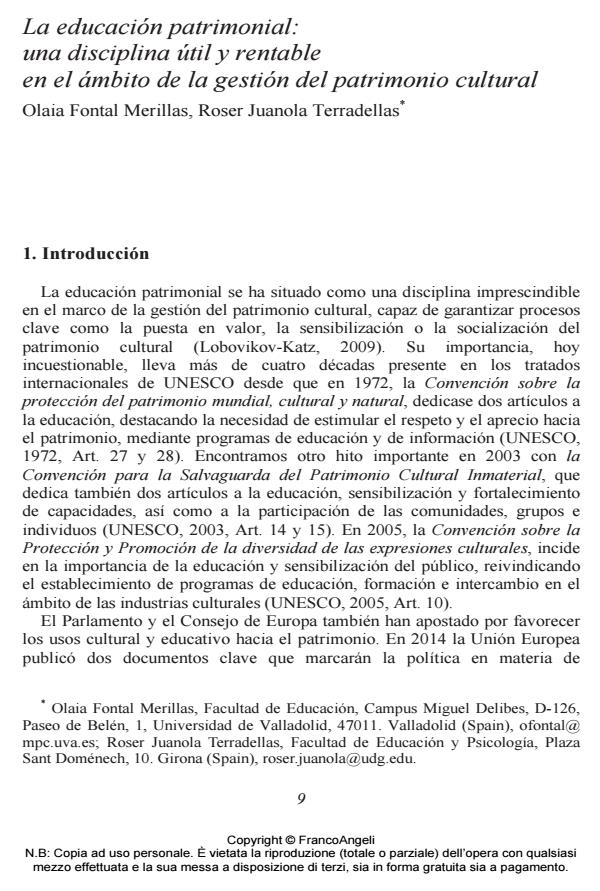Heritage Education: a useful and profitable discipline within the cultural heritage management
Journal title CADMO
Author/s Olaia Fontal Merillas, Roser Juanola Terradellas
Publishing Year 2015 Issue 2015/1
Language Spanish Pages 17 P. 9-25 File size 457 KB
DOI 10.3280/CAD2015-001002
DOI is like a bar code for intellectual property: to have more infomation
click here
Below, you can see the article first page
If you want to buy this article in PDF format, you can do it, following the instructions to buy download credits

FrancoAngeli is member of Publishers International Linking Association, Inc (PILA), a not-for-profit association which run the CrossRef service enabling links to and from online scholarly content.
Heritage Education is a discipline that has by now been able to develop a substantial body of theory and methodology and that moreover produced many examples of implemented and evaluated works. This means that we now have the foundations to build up coherent and ambitious proposals. In the view of the partial scrutiny conducted at the Spanish Heritage Education Observatory, we can posit the existence of a whole set of research lines to be further explored as well as a number of specific needs which, when properly met, will sensibly consolidate Heritage Education in Spain. Such gaps and demands as have been identified in the present article, in the form what we may call the future directions for heritage-related education over the upcoming decade. After many years of increasingly specialised research, Heritage Education has attained the status of a discipline in its own right, with a theoretical corpus, a powerful methodological array applicable to Heritage didactics and a high degree of specialisation and diversification in terms of focuses, models, designs and implementations. Therefore, Heritage Education is not only a main discipline within the cultural heritage management but useful and profitable too.
Keywords: Heritage education, didactics on cultural heritage, standards based programmes evaluation, National Education and Heritage Plan, Spanish Heritage Education Observatory.
- Transdisciplinary Multispectral Modeling and Cooperation for the Preservation of Cultural Heritage Stefano Della Torre, Rossella Moioli, Lorenzo Cantini, pp.319 (ISBN:978-3-030-12956-9)
- Heritage Education in The Archaeological Sites. An Identity Approach in The Museum of Calatayud Pilar Rivero, Olaia Fontal Merillas, Silvia García‐Ceballos, Marta Martínez Rodríguez, in Curator: The Museum Journal /2018 pp.315
DOI: 10.1111/cura.12258 - El patrimonio a través de la Educación Musical Marta Martínez Rodríguez, in Revista Electrónica Complutense de Investigación en Educación Musical - RECIEM /2021 pp.27
DOI: 10.5209/reciem.68682 - Patrimonios, objetos e historias de vida. Análisis de propuestas educativas desde el Observatorio de Educación Patrimonial en España Olaia Fontal Merillas, Silvia García-Ceballos, Borja Aso Morán, Marta Martínez Rodríguez, in Midas /2017
DOI: 10.4000/midas.1310
Olaia Fontal Merillas, Roser Juanola Terradellas, La educación patrimonial: una disciplina útil y rentable en el ámbito de la gestión del patrimonio cultural in "CADMO" 1/2015, pp 9-25, DOI: 10.3280/CAD2015-001002